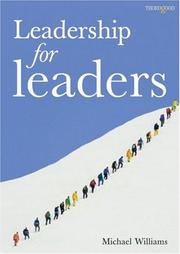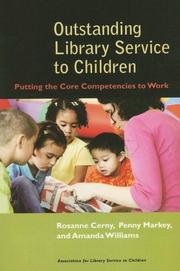| Listing 1 - 10 of 27 | << page >> |
Sort by
|
Book
ISBN: 0190230584 0199874751 9780199874750 9780190230586 1299750931 9781299750937 9780195386448 0195386442 Year: 2013 Publisher: New York : Oxford University Press,
Abstract | Keywords | Export | Availability | Bookmark
 Loading...
Loading...Choose an application
- Reference Manager
- EndNote
- RefWorks (Direct export to RefWorks)
Counseling psychologists have led the field of professional psychology in many areas including psychotherapy, supervision, vocational psychology, consultation, the promotion of human strengths, and the use of humanistic and empowering approaches to mental health promotion and treatment. As such, the specialization may be one of the broadest, most flexible, and widely applicable specialties in the field of applied and professional psychology. In Specialty Competencies in Counseling Psychology, Fuertes, Spokane, and Holloway provide a striking balance of the rich history of the counseling specia
Counseling psychology. --- Core competencies. --- Competence, Core --- Competencies, Core --- Core competence --- Ability --- Psychology, Applied
Book
ISBN: 0833093649 9780833093646 Year: 2015 Publisher: Santa Monica, California : RAND Corporation,
Abstract | Keywords | Export | Availability | Bookmark
 Loading...
Loading...Choose an application
- Reference Manager
- EndNote
- RefWorks (Direct export to RefWorks)
Workplace literacy. --- Core competencies. --- Competence, Core --- Competencies, Core --- Core competence --- Ability --- Occupational literacy --- Workforce literacy --- Functional literacy

ISBN: 1854183508 1854185497 1854188550 1423787137 9781423787136 9781854185495 9781854183552 1854183559 9781854183507 9786610233465 6610233462 128023346X 9781280233463 9781854188557 Year: 2005 Publisher: London : Rollinsford, N.H. : Thorogood Pub. Ltd. ; Books Network International,
Abstract | Keywords | Export | Availability | Bookmark
 Loading...
Loading...Choose an application
- Reference Manager
- EndNote
- RefWorks (Direct export to RefWorks)
Based on extensive research, this book challenges accepted 'norms' and establishes the 7 key competencies required for successful leadership today This challenging book is based on research carried out over seven years with over 2,500 senior managers in ten different companies, in USA and Europe. Michael Williams establishes and explains the 7 key competency clusters that matter most today: * Goal orientation * Integrity * Close engagement with others * 'Helicopter' perception * Resilient resourcefulness * Personal 'horsepower' * Resonant communications He also shows how much talent lies untapped in organisations and proposes methods of mobilising all this potential. He demonstrates how, for ultimate success, the key competencies need to be linked closely to: * Personal consistency * Discipline and Integrity * Intolerance of mediocrity * A concern to build mutual trust * Focused passion for the business * Recognition of the importance of emotional intelligence CONTENTS Close-quarter leadership Leadership theories, models - and common sense Leadership and the achievement ethic 'Buy-in', not by-pass: the rules of engagement Great leaders develop more great leaders Leading innovation - taking the organisation forward Leadership - a matter of mindset Making it happen - the leader's job THE AUTHOR Michael Williams has been a successful consultant for 25 years, specialising in leadership, team and organisational development. He has worked extensively with major corporations in the USA and both western and eastern Europe, including IBM, ICI, British Alcan, AT&T/ISTEL, GUS, McCain's and Shroders.
Executive ability. --- Leadership. --- Core competencies. --- Management. --- Management Styles & Communication --- Management --- Business & Economics --- Administration --- Industrial relations --- Organization --- Competence, Core --- Competencies, Core --- Core competence --- Ability --- Command of troops --- Followership
Book
ISBN: 0190230622 0199874875 9780199874873 1299756751 9781299756755 9780190230623 9780195389241 Year: 2014 Publisher: Oxford : Oxford University Press,
Abstract | Keywords | Export | Availability | Bookmark
 Loading...
Loading...Choose an application
- Reference Manager
- EndNote
- RefWorks (Direct export to RefWorks)
An increasing number of psychologists who were trained in clinical psychology, health psychology, or another specialty are gravitating toward rehabilitation psychology, but many of them have little or no experience with rehabilitation populations. With the explosion of interest in traumatic brain injury (TBI), many neuropsychologists are taking jobs in rehabilitation settings that treat people with TBI but also care for persons with the array of other disabling conditions such as spinal cord injury, stroke, MS, and amputation. In Specialty Competencies in Rehabilitation Psychology, Drs. Cox, C
Clinical psychology. --- Core competencies. --- Psychotherapists --- Mental health personnel --- Competence, Core --- Competencies, Core --- Core competence --- Ability --- Psychiatry --- Psychology, Applied --- Psychological tests --- Training of.

ISBN: 0838998402 9780838998403 9780838909225 0838909221 Year: 2006 Publisher: Chicago : Association for Library Service to Children, American Library Association,
Abstract | Keywords | Export | Availability | Bookmark
 Loading...
Loading...Choose an application
- Reference Manager
- EndNote
- RefWorks (Direct export to RefWorks)
What does it truly take to provide excellent library service to children? The Association for Library Service to Children (ALSC) has outlined seven core competencies—skills and best practices that are the building blocks for professional development for children's librarians. In this practical guide, three children's services experts bring these best practices to life. Each chapter, focusing on one of the competencies, gets new and experienced librarians up to speed fast by offering explanations, examples, and a substantial bibliography for more in-depth learning. Library managers gain trainin
Children's librarians --- Children's libraries --- Core competencies. --- Competence, Core --- Competencies, Core --- Core competence --- Ability --- Libraries --- Libraries, Children's --- Youth services in libraries --- Special libraries --- Libraries and schools --- Children's rooms
Book
ISBN: 1283212749 9786613212740 0838999042 9780838999042 9780838991671 083899167X 9780838935873 0838935877 9781283212748 6613212741 Year: 2011 Publisher: Chicago American Library Association
Abstract | Keywords | Export | Availability | Bookmark
 Loading...
Loading...Choose an application
- Reference Manager
- EndNote
- RefWorks (Direct export to RefWorks)
The first book to thoroughly expand on this important document, Young Adults Deserve the Best is a key foundational tool not only for librarians but also for young adult specialists, youth advocacy professionals, and school administrators.
Young adult services librarians --- Young adults' libraries --- Libraries and teenagers --- Core competencies. --- Competence, Core --- Competencies, Core --- Core competence --- Ability --- Libraries, Young people's --- Young people's libraries --- Special libraries --- Young adult librarians --- Librarians
Book
ISBN: 9282740749 Year: 1995
Abstract | Keywords | Export | Availability | Bookmark
 Loading...
Loading...Choose an application
- Reference Manager
- EndNote
- RefWorks (Direct export to RefWorks)
Research on teaching --- Personnel management --- European Union --- Core competencies --- Technical education --- Competence, Core --- Competencies, Core --- Core competence --- Ability --- Education, Technical --- Education --- Professional education --- Vocational education --- Eurotecnet (Programme) --- Occupational training --- Employees --- Formation professionnelle --- Personnel --- Effect of technological innovations on --- Effets des innovations sur --- Eurotecnet (Program)
Periodical
ISSN: 22853642 Year: 2012 Publisher: Bucharest, Romania : Editura Fundatiei România de Mâine,
Abstract | Keywords | Export | Availability | Bookmark
 Loading...
Loading...Choose an application
- Reference Manager
- EndNote
- RefWorks (Direct export to RefWorks)
Economic development --- Economic development. --- Environmental aspects --- Social aspects --- Social aspects. --- Environmental aspects. --- Eco-development --- Ecodevelopment --- Development, Economic --- Economic growth --- Growth, Economic --- economic development --- environment --- social sciences --- education --- innovation --- core competence --- Economic policy --- Economics --- Statics and dynamics (Social sciences) --- Development economics --- Resource curse
Book
ISBN: 3319300628 3319300644 Year: 2016 Publisher: Cham : Springer International Publishing : Imprint: Springer,
Abstract | Keywords | Export | Availability | Bookmark
 Loading...
Loading...Choose an application
- Reference Manager
- EndNote
- RefWorks (Direct export to RefWorks)
This book examines the challenges of cross-professional comparisons and proposes new forms of performance assessment to be used in professions education. It addresses how complex issues are learned and assessed across and within different disciplines and professions in order to move the process of “performance assessment for learning” to the next level. In order to be better equipped to cope with increasing complexity, change and diversity in professional education and performance assessment, administrators and educators will engage in crucial systems thinking. The main question discussed by the book is how the required competence in the performance of students can be assessed during their professional education at both undergraduate and graduate levels. To answer this question, the book identifies unresolved issues and clarifies conceptual elements for performance assessment. It reviews the development of constructs that cross disciplines and professions such as critical thinking, clinical reasoning, and problem solving. It discusses what it means to instruct and assess students within their own domain of study and across various roles in multiple contexts, but also what it means to instruct and assess students across domains of study in order to judge integration and transfer of learning outcomes. Finally, the book examines what it takes for administrators and educators to develop competence in assessment, such as reliably judging student work in relation to criteria from multiple sources. "... the co-editors of this volume, Marcia Mentkowski and Paul F. Wimmers, are associated with two institutions whose characters are so intimately associated with the insight that assessment must be integrated with curriculum and instructional program if it is to become a powerful influence on the educational process ..." Lee Shulman, Stanford University.
Education. --- Assessment. --- Professional & Vocational Education. --- Assessment, Testing and Evaluation. --- Learning & Instruction. --- Education --- Assessment --- Professional & Vocational Education --- Assessment, Testing and Evaluation --- Learning & Instruction --- Professions --- Performance. --- Core competencies. --- Competence, Core --- Competencies, Core --- Core competence --- Competence --- Ability --- Work --- Educational tests and measuremen. --- Professional education. --- Vocational education. --- Learning. --- Instruction. --- Learning process --- Comprehension --- Education, Vocational --- Vocational training --- Work experience --- Technical education --- Education, Professional --- Career education --- Education, Higher
Periodical
ISSN: 25191829 Year: 2016 Publisher: Paris Organisation for Economic Co-operation and Development,
Abstract | Keywords | Export | Availability | Bookmark
 Loading...
Loading...Choose an application
- Reference Manager
- EndNote
- RefWorks (Direct export to RefWorks)
Aujourd’hui, le concept de compétences ne renvoie pas uniquement aux compétences cognitives acquises dans le cadre institutionnel, mais également à des compétences plus relationnelles – telles que la capacité à communiquer et à travailler en équipe – acquises tout au long de la vie et essentielles pour la réussite sur le marché du travail. La série des Études de l’OCDE sur les compétences vise à aider les pays dans l’élaboration de leurs politiques sur les compétences afin de promouvoir la productivité, l’innovation et la croissance inclusive. Elle présente des indicateurs comparables au niveau international et des analyses stratégiques sur tout un ensemble de thèmes, dont : la qualité de l’enseignement et des programmes scolaires ; la transition entre les études et le monde du travail ; l’éducation et la formation professionnelle (EFP) ; l’emploi et le chômage ; l’innovation dans le domaine de l’apprentissage sur le lieu de travail ; l’entrepreneuriat ; la fuite des cerveaux et les migrants ; et l’adéquation entre les compétences et les exigences professionnelles.
Core competencies --- Education --- Ability --- Labor --- Labor and laboring classes --- Manpower --- Work --- Working class --- Abilities --- Aptitude --- Proficiency --- Skill --- Skills --- Talent --- Talents --- Expertise --- Children --- Education, Primitive --- Education of children --- Human resource development --- Instruction --- Pedagogy --- Schooling --- Students --- Youth --- Civilization --- Learning and scholarship --- Mental discipline --- Schools --- Teaching --- Training --- Competence, Core --- Competencies, Core --- Core competence --- Core competencies. --- Education. --- Ability. --- Labor.
| Listing 1 - 10 of 27 | << page >> |
Sort by
|

 Search
Search Feedback
Feedback About UniCat
About UniCat  Help
Help News
News